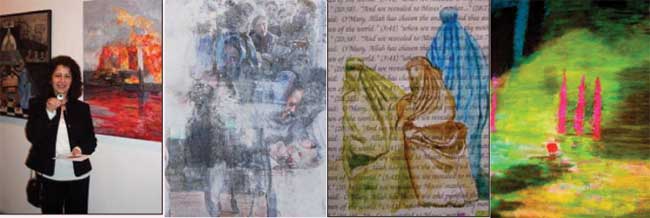Art Scene
Artist Tara Rashid Communicates through Powerful Images
By Fatima S. Khan

Above: Artist Tara Rashid and her paintings
There is no limit as to how art can be used to make life more sensible, according to Aesthetic Realism, an Institute formed by Eli Siegel. Art shows reality as it is, deeply, straight. It is freedom of oneness and order both unrestricted and accurate and it is the feeling of opposite’s continuity and discontinuity that art projects. The purpose of the Art is to make the ugliness of things bearable.
The ferocious energy depicted in the war scenes and subdued burqa-clad women in Tara Rashid’s artwork is deeply reflective of her feelings and compassion for the suffering of human life and the depravity of freedom.
Tara communicates through powerful images in opposing atrocities, injustice, and cruelty, massive and insensible destruction to human lives, and the unaccountable horrors of war. She portrays events on a deeply honest basis. Some images are direct questions addressed to the perpetrators of war. She brilliantly sketches the forceful impositions by religious fanatics and inhumane treatment of women. Images portray the perpetrators devoid of reason and logic; vehemently portraying in some artwork as judgment and reason coming from the human mind can be destructive, disruptive, and hopeless and a source of discontinuity.
The layout of each of her artwork has sensible structures logic and emotion. The brokenness and patches of scene of war, the despair and suffering in innocent faces, the emptiness of hope in the eyes of the victims are all honest projections of life, death, and the reality of war. The colors have a sad tone of shadowy haze, the blend of warm and interweaving cold tones of grey expresses gloom and doom. The tumbling of the blood masked in grey tones spells out fears of outright and blatant protests and censorship.
The series of four artworks with women obscured by veils, skillful and detailed, are a reflection of oppression and submission, brilliantly expressing hope in the choice of pastel tones of color.
For centuries, artists have used their brushes and paints to vehemently protest against the evils that often shadow reason leading to destruction and despair of humanity.
The horrors of war and the crushing of the human spirit in the name of religion can be seen in many of the paintings gracing the walls of major museums throughout the world, including the Metropolitan Museum of Art in New York, The Louvre in Paris, and the Prado in Madrid.
It is at the Prado that the great works of Spanish artist Francisco Goya (1746-1828) hang. Tara’s art has surprising similarities to Goya’s etching and aquatint media called “Caprichos” in protest to the Napoleonic invasion of Spain.
The contrasts are divisive and inclusive, they encapsulate deep concerns for the world in chaos and on the opposite end of the spectrum. She draws a sense of peace, harmony, and balance from nature - once again a close similarity to Goya. Goya taught his students to draw inspiration from Nature rather than the Greek sculptures.
Joyously unrestrained and enthusiastic, Tara’s tribute to nature is overflowingly lavish; strokes are horizontal and vertical of lush green hills and deep blue of the Pacific Ocean, of Newport Beach California , where she resides, instantly bringing a sense of calmness. She expresses the opposites and truly comes in full circle with reality.
Tara did her fine arts from UCLA and Graphic Design from CAL State Northridge.
She has had several Jury shows in Newport and Grand Central Gallery, Santa Ana. In addition group shows at South Asian American Art Festival in Santa Monica, California, Second City Art Council in Long Beach, where she was a recipient of an award. Her works are in private collection in Sydney Australia.
(The contributor Fatima S. Khan is Director of www.zanbeelart.com, an interactive website for South Asian artists. Tara Rashid’s artworks can be viewed on zanbeelart.com)
-------------------------------------------------------------------------------------

